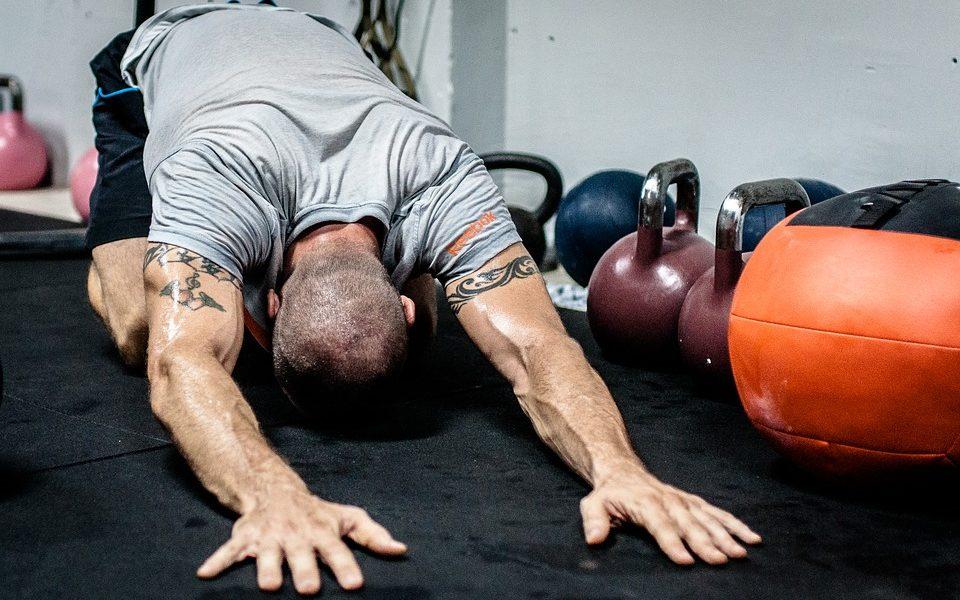

Do you want to avoid muscle strains and soreness or prevent any injuries in season? Check out these seven stretches every day to avoid back injuries, fatigue, soreness, and shin splints.
Whether you are a female or male bodybuilder, it’s crucial to stretch it out before throwing heavyweight. Stretching increases flexibility and reduces your risk of injury. It also increases blood flow through your muscles, which helps them recover faster after working out.
In this article, we’ll discuss the benefits of stretching, and some essential stretches to help you avoid injuries by keeping your muscles flexible and healthy.
Benefits of Stretching
Stretching is a vital component of a workout routine. It improves flexibility, increases range of motion, and prevents injury. Stretching can be performed anytime, anyplace. The different benefits of stretching are:
Improve Flexibility and Range of Motion
Stretching improves flexibility and range of motion. Flexibility refers to how far you can bend or stretch a joint or muscle. Range of motion refers to the total distance a joint can move through its entire movement against resistance.
Stretching increases flexibility and range of motion by increasing the length and elasticity of muscle fibers and tendons, which improve workout performance and help prevent injuries.
Flexibility is vital for all athletes who need a wide range of motion for their joints. Flexibility also helps prevent injuries by increasing joint stability, improving balance and coordination, relieving muscle tension, and improving circulation.
Improved Circulation
Stretching improves blood circulation and oxygen supply to muscles, allowing them to work harder for extended periods. This is especially when performing anaerobic exercises such as weightlifting or sprinting that require short bursts of energy followed by rest periods between sets (known as “interval training”).
Stretching also improves blood flow throughout the body and aids in recovery from exercise or injury by delivering nutrients to muscles more quickly. This also helps prevent muscle soreness or cramping after the workout.
Reduces Injury
Stretching makes you less prone to injury by increasing the range of motion in your joints, muscles, and tendons. If your muscles are inflexible, they’re more likely to pull on their attachments when you move them through their full range of motion. This can cause damage to the tendons or ligaments, which may lead to injury or pain during exercise or even after working out.
When you stretch, these areas become flexible and less likely to be damaged when pushed beyond their normal range of motion during exercise or daily activities.
Stretching Prevent Muscle Strains
Stretching helps protect against muscle strains, common in bodybuilders because they constantly push their muscles to their limits. Stretching also relieves muscle soreness after a workout session, making it easier to recover so you can get back into shape faster.
Break Down Lactic Acid
Stretching breaks down lactic acid, which builds up during exercise, causing soreness after a workout. Additionally, it facilitates blood circulation and lymphatic drainage, which help remove waste products from muscles and other tissues in the body. This will lead to improved recovery time between workouts and reduced soreness after exercising.
Relieves Stress
Stretching also helps you relax and relieve stress. When you stretch your muscles, the tension is released and replaced by relaxation. This helps promote a more calm, balanced mental state.
Different Stretches for Bodybuilders
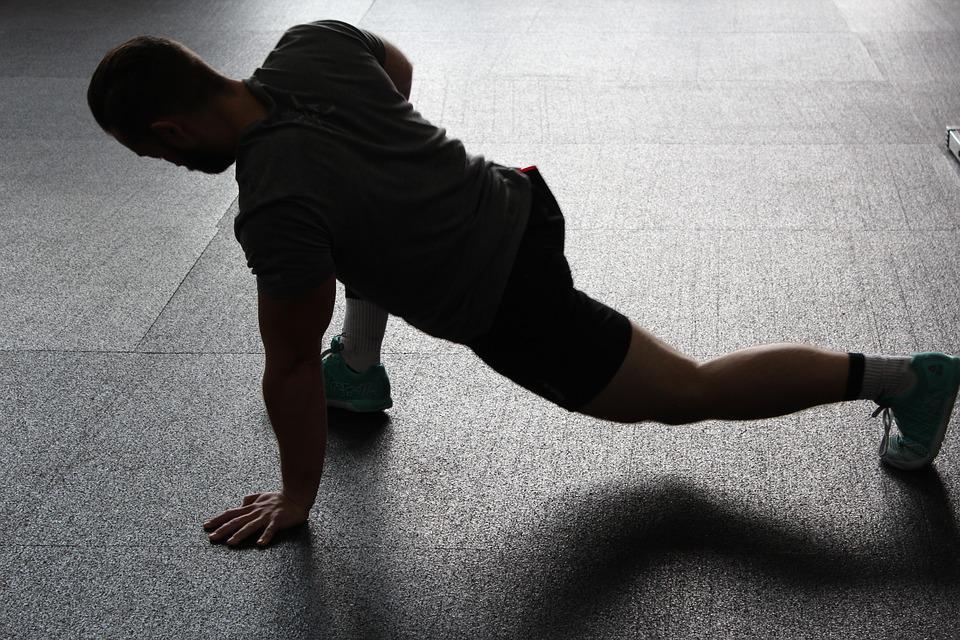
Depending on your goal, there are a variety of stretches you can perform to help achieve it. Below are seven different stretches for men and women you can do as a bodybuilder.
Pectoral Stretch
The pectoral stretch (pec stretch) is probably the most common stretch for the chest and shoulder muscles. It’s essential to perform this stretch before your workout because it will help loosen up your pectoral muscles to avoid getting injured during other exercises. You can do either doorway or lying stretch, but let’s do a lying pec stretch in our case.
How to Do Them Lying Pec Stretch
Lie down on your back with your fingers interlocked behind your head. Gently draw your elbows back toward the center of your body while keeping them straight to open up your shoulders and pec. You should feel a stretch in your torso.
Hold this position for 15 to 30 seconds, then relax. Repeat.
Neck Stretch
Stretching your neck is a great way to start your routine. It helps you prevent headaches, improves your posture, and relieves the tension in your shoulders.
How to Do a Neck Stretch Rotation
Step 1: Sit on an upright chair with your feet flat on the floor and arms resting at your sides.
Step 2: Tilt your head to the side as you comfortably can without moving your shoulders.
Step 3: Hold for 10 seconds, return to the center and relax your neck muscles before repeating another direction.
Do this exercise whenever you feel the tension in your neck or shoulders. Try also rotating your neck and shoulders in between stretches.
Hamstring Stretch
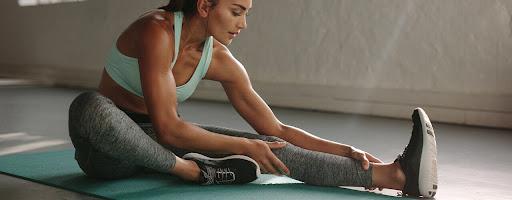
A hamstring stretch is a gentle exercise that can help you improve mobility and flexibility in your lower back and legs. The hamstring muscles are on the back of your thighs, and they’re responsible for bending your knee when you walk and run.
It is recommended to stretch your hamstrings before any activity that involves running or walking long distances. If you’re going for a run, doing some hamstring stretches before you start running will help loosen up those muscles and reduce pain and injury risk.
How to Do It
Stand straight with one leg slightly bent behind you at hip level while keeping your hands on the hips of that bent leg. Lean forward gently until you feel a mild stretch along the length of the back thigh. Hold for 15 seconds, then switch legs. Ensure you keep your back straight to avoid hunching over your leg.
Happy Baby Pose Stretch
The happy baby stretch is a great way to relieve back pain and move your body again. It also helps relieve tension in your hips and shoulders. You can do it in different positions. Here is an example below:
How to Do Happy Baby Stretch
Step 1: Lie on your back flat on the ground with your knees bent and lift your legs so that your knees are bent at 90 degrees, and your feet are parallel to the ceiling.
Step 2: Hold onto each foot with both hands while keeping your toes pointed towards the roof with your bottom firmly planted on the ground.
Step 3: Push knees out from each other as far as possible while keeping feet together and heels off the ground (don’t let them touch), then slowly lower knees down towards the floor about 1 foot apart to deepen the stretch.
Step 4: Relax your shoulders and keep your head and neck on the ground. You should feel a stretch in your thighs and groin area after holding this position for several seconds (5-10 breaths).
Kneeling Lunge Stretch
The kneeling lunge stretch is an excellent stretch for weightlifting to get your lower body loose before you start working out. Not only does it help to improve flexibility, but it also increases your blood flow and circulation.
How to Do It
Kneel on one knee, keeping your back knee straight and your front foot flat on the floor. Lean forward gently until you feel a stretch in your quadriceps (thigh). Keep your knees over or behind your toes, and don’t let them go past your toes.
Hold for 10-30 seconds, then come back to standing on both feet again. Repeat this stretch on both sides.
Windshield Wiper Stretch
Windshield wiper stretch is a unique exercise to increase flexibility and loosen up hip flexors and knots from sleeping. The hip flexors are muscles in the front of the thigh which help you lift your knee towards your chest.
How to Do It
While lying on the floor, move your knees to the chest and lift your legs straight to the ceiling. While they are extended, lower them to the left side.
Hold it for 10 seconds, move the legs straight up in the air and lower them to the right side. Repeat three times on each side.
Figure 4-stretch
The figure 4 stretch is a great hip flexor and quadriceps stretch. It also stretches the calves, hamstrings, and Achilles tendons.
How to Do Figure 4-stretch
To do this stretch, lie on your back with one leg bent and the other straight. Bring the straight leg up to 90 degrees with your knee pointing toward the ceiling. Cross your bent leg over your straight leg, ensuring that your ankle doesn’t rotate inward or outward.
Hook your fingers behind the knee of your bent leg and gently pull it toward the chest until you feel a stretch in the front of that thigh. You should feel it mainly in the hip and glute and not so much in its back. Hold for 5 breaths, then switch sides.
Different Stretches To Do at the Beginning vs. At the End of Workout
It’s a good idea to stretch before and after every workout. However, you should know different types of stretching are best suited for different times during your stretching routine.
The first type of stretching is static stretching. It involves holding a position for several seconds while contracting, and relaxing muscles stretched around the joint. Static stretching is typically done after a workout when muscles are warm and relaxed.
The second type of stretching is dynamic stretching, which involves moving through a range of motion while relaxing your muscles and joints. Dynamic stretches are typically performed before a workout — to warm up your muscles and increase your heart rate.
The table below shows some of the active (before work) and static (after workouts) stretches you can incorporate into your stretching routine.
Dynamic stretches ( at the beginning of workouts) stretches Static (at the end of exercises) stretches
Standing hamstring stretch Kneeling lunge stretch
Pec stretch/ shoulder stretch Calf stretch
Happy child pose Cow–cat stretch
Knee to chest stretch Lying hamstring stretch
Modifications Shoulder stretch
Side stretch Cobra stretch
Bottom Line
Whether you’re a professional bodybuilder or just starting a new workout regimen, stretching is vital for any exercise routine. It can help boost your performance, improve flexibility, prevent injuries and lengthen your muscles to reduce soreness and stiffness.
Now you know these benefits of stretching, you can put them to good use—not only in the gym but also at home. Hopefully, these stretches will get you started on your stretching routine.
Start stretching it out today!







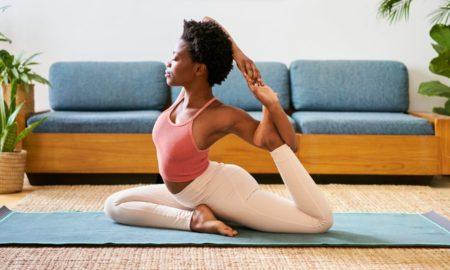








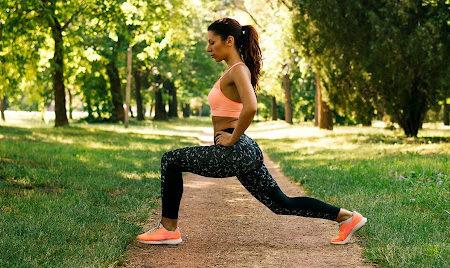


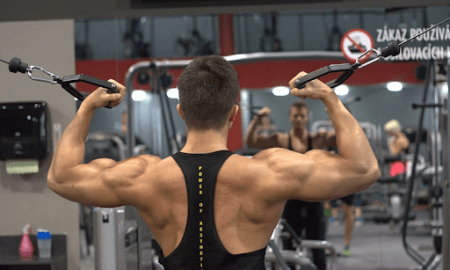
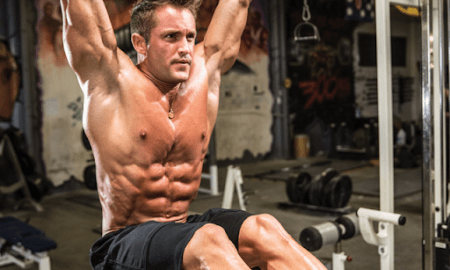
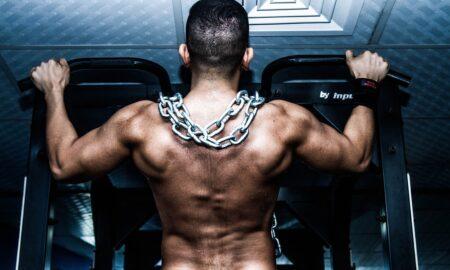
You must be logged in to post a comment Login